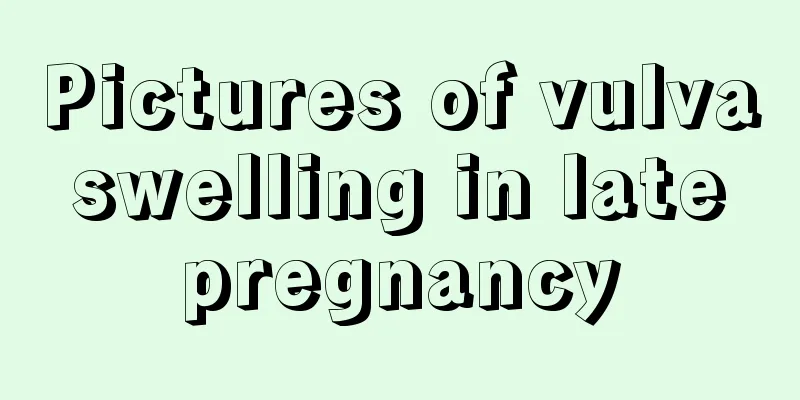Are older mothers more likely to give birth prematurely?

|
Women who become pregnant after the age of 35 can be said to be elderly mothers. Generally, elderly mothers face a very high risk during pregnancy because their uterine environment is relatively poor, which is not conducive to the development of the baby. Therefore, abnormalities are prone to occur in the late stages of pregnancy, leading to premature birth of the baby. Therefore, elderly mothers must pay more attention in the late stages of pregnancy. Risks of older mothers: 1. Increased spontaneous abortion rate Chromosome abnormalities are more likely to occur in older women, so the incidence of spontaneous abortion in early pregnancy increases significantly. Data shows that for older women who are pregnant with their first child, the miscarriage rate can be as high as 20% in the early stages of pregnancy, which is 2-4 times that of women of childbearing age. 2. Increased premature birth rate The intrauterine environment of older pregnant women is relatively poor, which is not conducive to the growth and development of the fetus. Abnormalities are prone to occur in the late pregnancy, causing the fetus to be born prematurely. Data shows that the premature birth rate in advanced pregnancy is four times that of women of childbearing age. 3. Increased rate of dystocia When a woman is too old, the joints of the uterine cervix, perineum and pelvis become hardened, making it difficult for them to expand during childbirth. The contraction force of the uterus and the stretch force of the vagina are also poor, resulting in slow delivery, prolonged delivery, and easy dystocia. 4. Breast cancer rates increase According to research data, the incidence of breast cancer in women who give birth for the first time over the age of 35 is much higher than that in those who give birth for the first time before the age of 30, and the incidence increases with age. 5. Increased incidence of infertility The incidence of infertility will increase significantly if pregnancy occurs later than the age of 35. This is mainly the result of physiological and endocrine changes in the body. 6. The incidence of congenital dementia increases After the age of 35, women's egg maturation process is prolonged, and chromosomes are prone to aging, decay or deformation, leading to an increased incidence of congenital dementia. Data show that the incidence rate of congenital dementia in pregnant women aged 25-34 is only 1:1350, while it is as high as 1:260 in pregnant women aged 35-39. 7. Hypertension and diabetes are more likely to occur during pregnancy As people age, their chances of developing diseases such as high blood pressure and diabetes increase. Therefore, after older women become pregnant, as their body metabolism changes, the rate of suffering from these diseases during pregnancy will also increase. Data show that the incidence of gestational hypertension in older pregnant women is 2-4 times higher than that in pregnant women of appropriate age; the incidence of diabetes and gestational diabetes is more than 3 times higher than that in pregnant women aged 25-29. 8. Slow recovery after childbirth After the age of 35, the functions of organs and tissues throughout the body begin to decline. Not only are various postpartum diseases more likely to occur after childbirth, but the endocrine system's ability to adjust the body and the reproductive organs' ability to recover will also be weakened. Data shows that the older you are when you give birth, the slower your body recovers after childbirth. 9. The child is born weak After the age of 35, women's physical functions begin to decline, and their uterus's ability to conceive and provide nutrition to the fetus is worse than that of women of childbearing age. Data shows that children born to older pregnant women, especially first-born children, have relatively weaker immunity and are more likely to develop various diseases, such as leukemia. 10. Poor mental state For women over 35 years old, the psychological burden of carrying a fetus is greater than that of pregnant women of childbearing age. In addition, various social and family pressures can easily put them in a state of mental tension, which is not conducive to their own health and the growth and development of the fetus. |
<<: What to do if you have naturally low progesterone?
>>: Should I take progesterone tablets before or after meals?
Recommend
What are the breast enhancement exercises for girls?
Almost every girl wants to have plump breasts. Pl...
Vaginal atrophy during menopause
Menopause is a period that no woman wants to face...
Pictures of common gynecological diseases
The physiological structure of female friends is ...
Introduction to lower abdominal pain in pregnant women
Pregnant women should take lower abdominal pain s...
What are the characteristics, life features and appearance of ants? Types of ants and their main jobs
Ants are the most common insects on earth and the...
How much does it cost to remove accessory breast?
How much is the hospitalization fee for patients ...
Heart disease symptoms during pregnancy
During this period, we cannot rule out the possib...
How can ovarian cysts be detected?
Ovarian cysts are very harmful to the female body...
Can common ovarian cysts cause abdominal pain?
Ovarian cysts are very common gynecological disea...
What should I do if my leucorrhea is bloody?
Many women have other problems in their bodies du...
Can I have normal sex life with uterine prolapse?
Uterine prolapse is also commonly known as uterin...
Is the fifth day after menstruation a safe period?
The safe period mainly refers to the five days be...
What causes white spots on nipples?
Breast health is very important for every woman, ...
What are the methods of abortion at 12 weeks?
Once a woman becomes pregnant, she needs to pay m...









